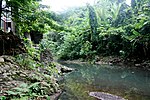University of the Philippines Los Baños Institute of Plant Breeding
Agricultural organizations based in the PhilippinesAgricultural research institutesBiological research institutesBotanical research institutesGenetics or genomics research institutions ... and 3 more
Plant breedingResearch institutes in the PhilippinesUniversity of the Philippines Los Baños
The Institute of Plant Breeding (IPB) is a research institute of the University of the Philippines Los Baños. It is the national biotechnology research center and repository for all crops other than rice, which is handled by the Philippine Rice Research Institute. It traces its roots to the Plant Breeding Division of the Department of Agronomy, College of Agriculture. Dr. Emil Q. Javier later spearheaded the elevation of the division to an institute, which was approved and given funding under Presidential Decree No. 729 in June 1975, with Javier also serving as the institute's first director.
Excerpt from the Wikipedia article University of the Philippines Los Baños Institute of Plant Breeding (License: CC BY-SA 3.0, Authors).University of the Philippines Los Baños Institute of Plant Breeding
IPB Road,
Geographical coordinates (GPS) Address External links Nearby Places Show on map
Geographical coordinates (GPS)
| Latitude | Longitude |
|---|---|
| N 14.153752777778 ° | E 121.26181111111 ° |
Address
Institute of Plant Breeding
IPB Road
4031
Laguna, Philippines
Open on Google Maps




